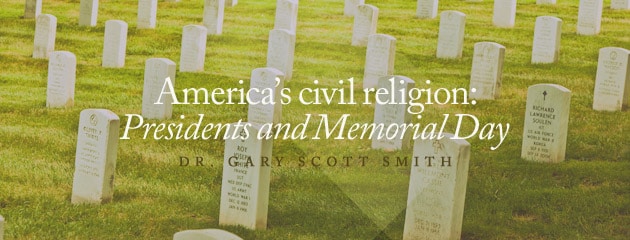
Throughout American history presidents have often used religious rhetoric for various reasons: to provide comfort and consolation, argue that God providentially directs our nation, celebrate our Christian heritage, defend democracy, hold citizens and the country accountable to transcendent standards, help accomplish their own political aims, justify America’s actions, foster traditional morality and justice, promote prayer and Bible reading, call for national and individual repentance, unite Americans, and satisfy citizens’ expectations.
No matter what their private religious beliefs, presidents have been strongly influenced by America’s civil religion in performing their official duties. Regularly invoking God in inaugural addresses and on other important occasions, the president has functioned as the nation’s “principal prophet, high priest, first preacher, and chief pastor.” Presidents have used religious rhetoric to reassure citizens that God rules the universe and loves them as they fought enemies in the War of 1812, the Spanish American War, and World War I and II, as they combatted communist aggression during the Cold War, engaged in military action in Korea, Afghanistan, and Iraq, and dealt with disasters in space and terrorist threats at home.
Presidents have also used religious rhetoric and quoted the Bible to celebrate religious holidays and commemorate those who defended our nation through their military service. Their proclamations about Memorial Day illustrate this.
Benjamin Harrison first recognized Decoration Day in 1891, and presidents have consistently issued Memorial Day statements since 1929. Their declarations have typically asked God to bless those who died defending the nation and have urged Americans to pray and work for peace.
Reflecting on the outcome of the Civil War, Harrison argued in a May 30, 1891 speech at Independence Hall in Philadelphia that Americans had “settled perpetually the question of loyal submission to the Constitution and the law in all the States.” He proclaimed, “We honor those who died in the service of their country” and joyfully and thankfully commemorate “what they did. We mourn for them as comrades who have departed,” but “the glory of their achievement” has given them imperishable honor.
In the aftermath of World War II, Harry Truman declared in 1948 that Memorial Day provided an appropriate occasion for Americans, who had long been devoted to furthering peace, to reflect about “the human losses resulting from the ravages of war.” Remembering “beloved friends and relatives who were sacrificed in the ordeal of battle” should inspire citizens to redouble their “exertions in a mighty striving” for “the long-sought basis of an unbreakable, righteous peace.” Truman urged Americans “to acknowledge our need for divine guidance” and to pray that “permanent peace may prevail among men.”
Celebrating Memorial Day in 1962, a few months before the Cuban Missile Crisis, John F. Kennedy praised the “supreme and selfless sacrifice of those who gave their lives” to help ensure that succeeding American generations enjoyed “the spiritual and material blessings of our free society.” These men and women had also advanced the cause of freedom around the world and were “an inspiration to us all.” He challenged citizens to live by “the same virtues of loyalty, courage, and devotion to country that characterized our fallen heroes.” Kennedy also exhorted Americans to invoke “the blessing of God on those who have died in defense of our country” and to pray that “peace and justice shall prevail.”
In 1987, as the Cold War neared its end, Ronald Reagan asserted that “any American who has ever listened to a bugler sound Taps” whether it was “halfway around the world” or on “a lonely tarmac stateside” knows “why we set aside a special day each year to honor those who have died for our country and to pray for permanent peace.”
“We do so,” Reagan explained, “for the sons and daughters of our land who have perished in the cause of liberty.” He added, “We do so,” to honor the nation that “gave them their birthright of freedom” and “to revere, defend, and preserve” all these brave heroes and heroines who have given their lives to make the nation secure.
Reagan beseeched God to bless “those who have died for our country” and “take them to Himself and reward their patriot’s love.” He prayed that God would give Americans the devotion and strength to build upon their foundation and create a more peaceful world “so that one day Taps will sound never again for the young and the brave and the good.”
As we celebrate Memorial Day this year, may we remember the sacrifice that millions of Americans have made to preserve our freedom and help promote peace and justice in our troubled world.

